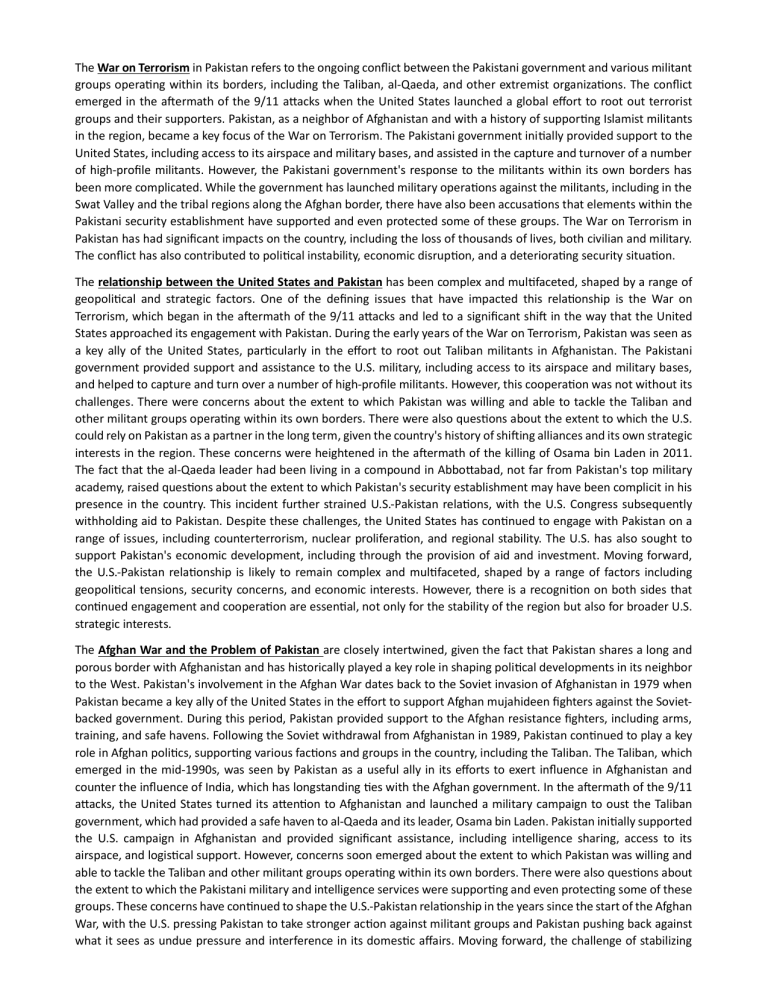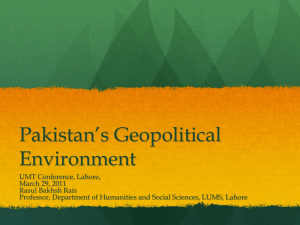
The War on Terrorism in Pakistan refers to the ongoing conflict between the Pakistani government and various militant groups opera ng within its borders, including the Taliban, al-Qaeda, and other extremist organiza ons. The conflict emerged in the a ermath of the 9/11 a acks when the United States launched a global effort to root out terrorist groups and their supporters. Pakistan, as a neighbor of Afghanistan and with a history of suppor ng Islamist militants in the region, became a key focus of the War on Terrorism. The Pakistani government ini ally provided support to the United States, including access to its airspace and military bases, and assisted in the capture and turnover of a number of high-profile militants. However, the Pakistani government's response to the militants within its own borders has been more complicated. While the government has launched military opera ons against the militants, including in the Swat Valley and the tribal regions along the Afghan border, there have also been accusa ons that elements within the Pakistani security establishment have supported and even protected some of these groups. The War on Terrorism in Pakistan has had significant impacts on the country, including the loss of thousands of lives, both civilian and military. The conflict has also contributed to poli cal instability, economic disrup on, and a deteriora ng security situa on. The rela onship between the United States and Pakistan has been complex and mul faceted, shaped by a range of geopoli cal and strategic factors. One of the defining issues that have impacted this rela onship is the War on Terrorism, which began in the a ermath of the 9/11 a acks and led to a significant shi in the way that the United States approached its engagement with Pakistan. During the early years of the War on Terrorism, Pakistan was seen as a key ally of the United States, par cularly in the effort to root out Taliban militants in Afghanistan. The Pakistani government provided support and assistance to the U.S. military, including access to its airspace and military bases, and helped to capture and turn over a number of high-profile militants. However, this coopera on was not without its challenges. There were concerns about the extent to which Pakistan was willing and able to tackle the Taliban and other militant groups opera ng within its own borders. There were also ques ons about the extent to which the U.S. could rely on Pakistan as a partner in the long term, given the country's history of shi ing alliances and its own strategic interests in the region. These concerns were heightened in the a ermath of the killing of Osama bin Laden in 2011. The fact that the al-Qaeda leader had been living in a compound in Abbo abad, not far from Pakistan's top military academy, raised ques ons about the extent to which Pakistan's security establishment may have been complicit in his presence in the country. This incident further strained U.S.-Pakistan rela ons, with the U.S. Congress subsequently withholding aid to Pakistan. Despite these challenges, the United States has con nued to engage with Pakistan on a range of issues, including counterterrorism, nuclear prolifera on, and regional stability. The U.S. has also sought to support Pakistan's economic development, including through the provision of aid and investment. Moving forward, the U.S.-Pakistan rela onship is likely to remain complex and mul faceted, shaped by a range of factors including geopoli cal tensions, security concerns, and economic interests. However, there is a recogni on on both sides that con nued engagement and coopera on are essen al, not only for the stability of the region but also for broader U.S. strategic interests. The Afghan War and the Problem of Pakistan are closely intertwined, given the fact that Pakistan shares a long and porous border with Afghanistan and has historically played a key role in shaping poli cal developments in its neighbor to the West. Pakistan's involvement in the Afghan War dates back to the Soviet invasion of Afghanistan in 1979 when Pakistan became a key ally of the United States in the effort to support Afghan mujahideen fighters against the Sovietbacked government. During this period, Pakistan provided support to the Afghan resistance fighters, including arms, training, and safe havens. Following the Soviet withdrawal from Afghanistan in 1989, Pakistan con nued to play a key role in Afghan poli cs, suppor ng various fac ons and groups in the country, including the Taliban. The Taliban, which emerged in the mid-1990s, was seen by Pakistan as a useful ally in its efforts to exert influence in Afghanistan and counter the influence of India, which has longstanding es with the Afghan government. In the a ermath of the 9/11 a acks, the United States turned its a en on to Afghanistan and launched a military campaign to oust the Taliban government, which had provided a safe haven to al-Qaeda and its leader, Osama bin Laden. Pakistan ini ally supported the U.S. campaign in Afghanistan and provided significant assistance, including intelligence sharing, access to its airspace, and logis cal support. However, concerns soon emerged about the extent to which Pakistan was willing and able to tackle the Taliban and other militant groups opera ng within its own borders. There were also ques ons about the extent to which the Pakistani military and intelligence services were suppor ng and even protec ng some of these groups. These concerns have con nued to shape the U.S.-Pakistan rela onship in the years since the start of the Afghan War, with the U.S. pressing Pakistan to take stronger ac on against militant groups and Pakistan pushing back against what it sees as undue pressure and interference in its domes c affairs. Moving forward, the challenge of stabilizing Afghanistan and preven ng it from once again becoming a safe haven for terrorist groups will remain a cri cal issue for the region, one that will require con nued engagement and coopera on between the United States, Pakistan, and other regional partners. According to the Pakistan Ins tute for Peace Studies, between 2001 and 2019, there were a total of 83,000 conflictrelated fatali es in Pakistan, including both militants and civilians. In addi on, there were 19,000 security force personnel killed during this period. The impact of the War on Terrorism in Pakistan has been significant in other ways as well. The conflict has led to widespread displacement, with an es mated 2.7 million people forced to flee their homes due to violence and insecurity. The conflict has also had a significant impact on Pakistan's economy, with es mates sugges ng that the country has lost over $126 billion in economic output due to the conflict.



